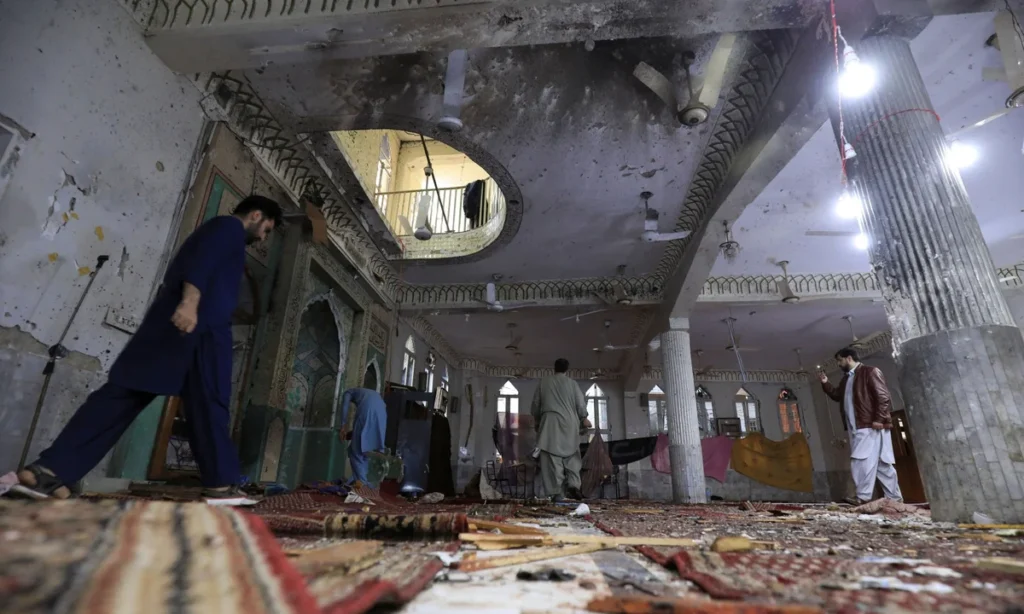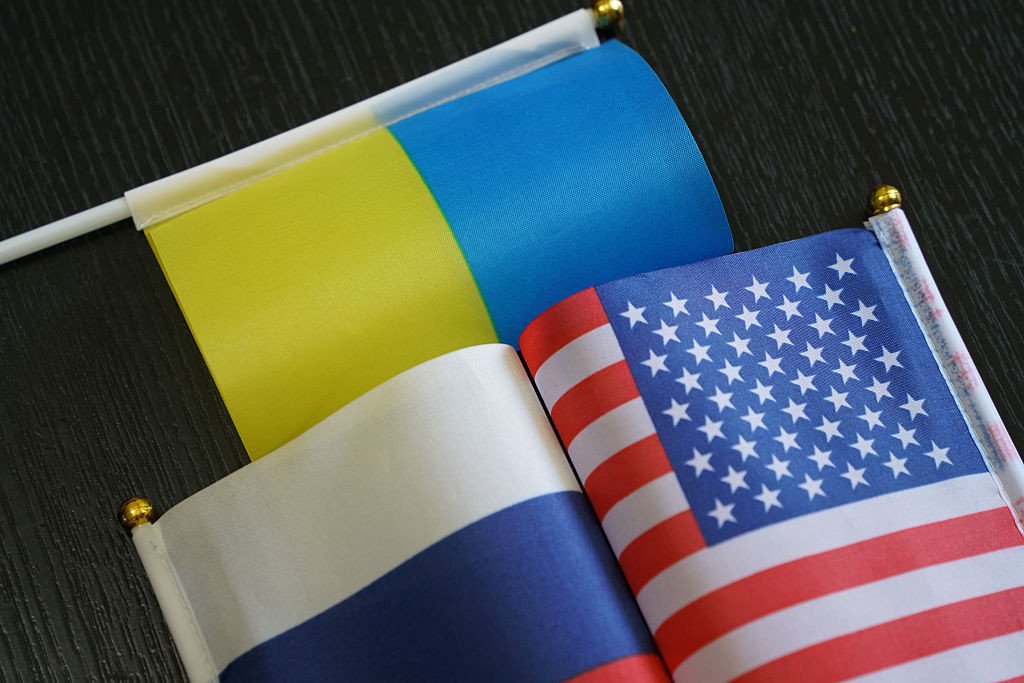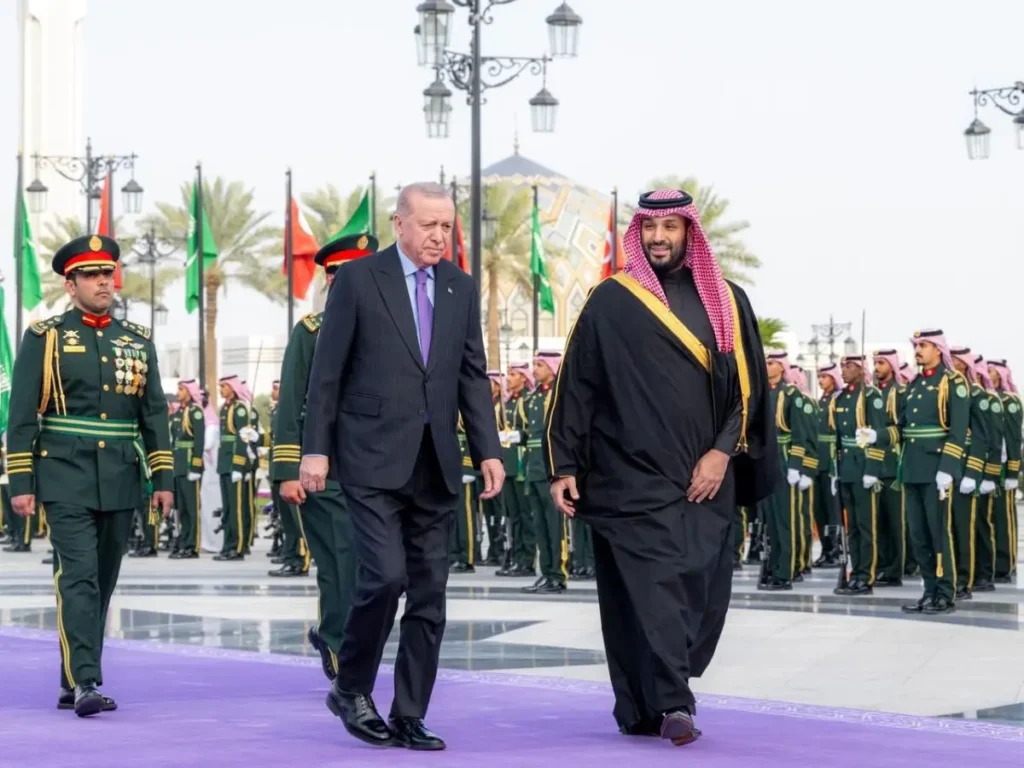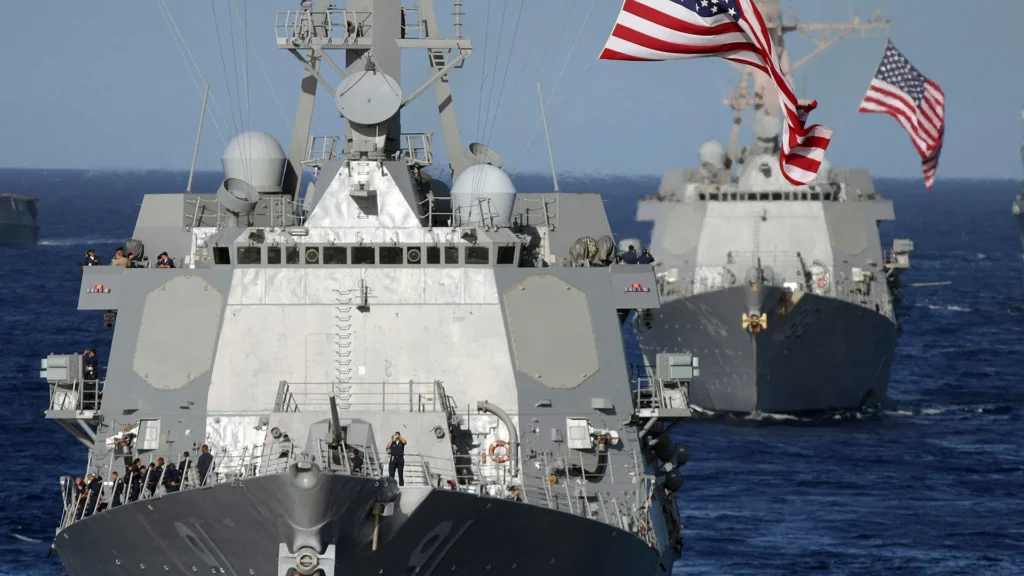
President Donald J. Trump appears poised to take direct action against Venezuela’s regime – not for mere saber-rattling, but to finish what he sees as unfinished business. The target is twofold: to dismantle the so-called “Cartel of the Suns” (a narcotrafficking ring operating within the Venezuelan state) and to topple Nicolás Maduro’s dictatorial government. Trump’s own words and actions have laid the groundwork for such an operation. From prior military warnings to strategic calculations about drug cartels and geopolitical foes, the case for a U.S. strike on Maduro’s narco-regime has been building.
Below, we examine three key reasons why Trump will likely order an attack on Venezuela – and why this time the U.S. Navy warships off Venezuela’s coast aren’t just there for show.
Warnings ignored
In April 2020, during Trump’s first term, Washington sent a huge warning shot to Caracas. President Trump abruptly announced that U.S. Navy ships were being deployed toward Venezuela as part of an “enhanced counter-narcotics” mission – a move that came immediately after U.S. prosecutors indicted Maduro and his inner circle for narco-terrorism. This was a dramatic break from the usual agenda (the announcement even interrupted a COVID-19 briefing) and was explicitly linked to Maduro’s alleged cocaine trafficking conspiracy. The deployment involved Navy destroyers, surveillance aircraft, and Special Forces, nearly doubling U.S. counternarcotics capability in the Caribbean. It put the Maduro regime on notice that the United States was willing to project military power in Venezuela’s vicinity. As U.S. Senator Marco Rubio noted at the time, if he were in Maduro’s shoes – freshly indicted with a $15 million bounty on his head and U.S. warships off his coast – he’d be very worried. And that was precisely the point: 2020 was the first big warning.
Fast-forward to 2025, and those warnings have escalated into action. President Trump, now in his renewed term, has again dispatched warships to Venezuela’s waters – only this time they’re not just there to make a point. At least three guided-missile destroyers (such as the USS Gravely and USS Jason Dunham) have been sent toward Venezuela, carrying around 4,000 U.S. Marines and sailors as part of a massive counter-cartel mission. These ships, equipped with Tomahawk cruise missiles and accompanied by spy planes and even a submarine, are capable of launching precision strikes if the order is given. In essence, Trump has transitioned from symbolic shows of force to positioning an invasion-capable force at Maduro’s doorstep.
The message is unmistakable: previous ultimatums have expired, and an operation to physically eliminate the Cartel of the Suns and the Maduro regime is now on the table. As one Pentagon spokesman put it, the cartels and their allied regimes “have engaged in historic violence and terror throughout our hemisphere” – and the U.S. military will play a key role in eliminating their ability to threaten American lives. The presence of U.S. destroyers just miles from Venezuela’s coast is thus a final notice that Washington’s patience has run out. What began as warnings in 2020 is now an active preparation for confrontation.
Sending a message to cartels – Without invading an ally
An American operation against Maduro’s Venezuela would not only target that regime – it would also send a powerful message to every drug cartel in the hemisphere, especially those just across the U.S. border. President Trump has long argued that Latin American cartels are pumping lethal drugs (like fentanyl-laced cocaine) into American communities and fueling chaos and crime. He has even taken the unprecedented step of designating major cartels as Foreign Terrorist Organizations, putting them in the same category as ISIS or al-Qaeda. This means Trump views cartels not just as criminal gangs, but as insurgent threats – and he’s prepared to use U.S. military force to crush them. However, there’s one big catch: where to strike. Going after cartels on Mexican soil would trigger a diplomatic firestorm with a neighboring ally. In fact, Mexico’s president (currently Claudia Sheinbaum) has flat-out rejected any U.S. military intervention on Mexican territory, asserting national sovereignty. Any incursion into Mexico, no matter how well-intentioned, would cross a red line for Mexico City.
That’s where Venezuela comes in. Unlike Mexico, Venezuela under Maduro is a pariah state with no such protections – the U.S. (and dozens of other nations) don’t even recognize Maduro as the legitimate leader, viewing him instead as a brutal usurper and narco-dictator. By striking the Cartel of the Suns on Venezuelan soil (and waters), Trump can achieve the same objective as hitting the Mexican cartels, but without infringing on an ally’s sovereignty. It’s a classic Trump move: hit the enemy at a point where they have no legal or diplomatic shield. The Cartel of the Suns is deeply embedded in Venezuela’s state apparatus, effectively turning the country into a narco-state. Dismantling it with military force would naturally send shockwaves through other cartels – if we can take out a cocaine empire 1,300 miles away, imagine what we can do closer to home. In other words, a Venezuela operation is a demonstration of resolve and reach. It warns cartels in Mexico, Colombia, or anywhere else that the U.S. is willing to cross borders and use heavy firepower to destroy them. As the Trump White House has emphasized, the President is prepared to use “every element of American power” against the drug lords flooding the U.S. with narcotics. Taking down Maduro’s cartel-hosting regime in Venezuela would prove that point decisively – all while avoiding a messy ground war right on the U.S.-Mexico border. The fallout would be a wakeup call to every cartel boss: nowhere is out of reach for Trump’s America.
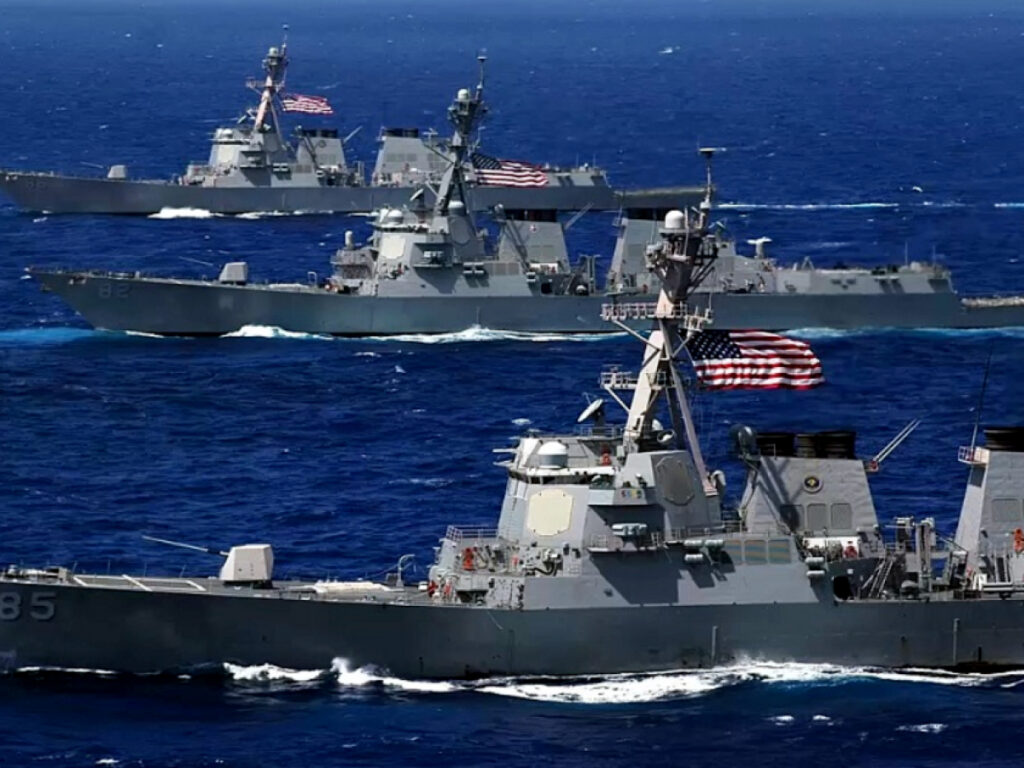
Moreover, by picking Venezuela as the battleground, Trump also shores up domestic political support for tough action. There is bipartisan recognition that Maduro’s regime is deeply criminal (even many U.S. Democrats have condemned his human rights abuses and rigged elections). Striking a socialist dictatorship in South America garners far more public support than any operation that violates Mexican sovereignty. It plays into a legacy of the Monroe Doctrine – asserting U.S. power in its hemisphere against hostile forces – without the baggage of invading a friendly neighbor. In short, Venezuela is the ideal target: it checks the box as a major narco-trafficking hub and serves as a strategically located foe that Washington can move against with moral and legal justification. The ripple effects on other cartels will be unequivocal: if you traffic deadly drugs and destabilize our communities, you could be next on the list, whether you hide in the mountains of Sinaloa or the jungles of South America.
Eliminating a narco-terrorist regime to secure US interests
Finally, the drive to attack Maduro’s Venezuela is about more than drugs – it’s about removing a toxic regime that threatens U.S. national security on multiple fronts. Nicolás Maduro’s government isn’t just a corrupt dictatorship; it has been described by the Trump administration as a “narco-terror” cartel masquerading as a government. The Cartel of the Suns – named for the sun insignias on Venezuelan generals’ uniforms – is believed to be a cocaine trafficking network overseen by top figures in Maduro’s military and political circle. In fact, U.S. authorities accuse Maduro himself of being the leader of this cartel, and have placed a whopping $50 million bounty on his head for drug-trafficking charges. Washington officially designated Maduro’s Cartel of the Suns as a foreign terrorist organization, underscoring that the regime’s drug business is viewed as on par with terrorism. This means Maduro’s Venezuela isn’t just a failed state or ideological adversary – in Trump’s eyes, it’s a narco-terrorist state actively pumping poisons into American cities. Taking it out is a matter of national self-defense. By launching an operation to decapitate the Cartel of the Suns and remove Maduro, Trump would be striking at one of the root sources of America’s fentanyl and cocaine epidemic. He would also be delivering justice to a dictator indicted for narco-terrorism back in 2020 – effectively collecting on that $50 million bounty with the U.S. military doing the job that indictments and sanctions couldn’t.
Importantly, ousting Maduro would yield benefits that extend far beyond the drug war. For years, Venezuela has been a geopolitical beachhead for American adversaries and a source of instability in the Western Hemisphere. Under Maduro’s rule, Venezuela opened its doors to Communist China, Vladimir Putin’s Russia, and even Iran’s mullahs, allowing them to gain a foothold in US backyard. Beijing, for instance, has poured money and technology into Maduro’s regime – supplying loans, surveillance tech, and military hardware – in exchange for influence over Venezuela’s vast oil reserves and infrastructure. Moscow has provided the Maduro regime with weapons and political cover, while Iran has shipped fuel and built clandestine networks in Venezuela. The result has been a direct challenge to U.S. strategic interests: China gets stronger in our backyard, and America’s regional leverage erodes. A successful intervention in Venezuela would slam the door on these hostile powers. It would prevent Beijing from “squeezing out” American influence via control of Venezuelan oil, and stop China (or Russia) from using Venezuela as a lever against the U.S. In effect, removing Maduro would yank away a platform that global rivals have been using to undermine the United States in Latin America.
Additionally, regime change in Caracas could help stem the hemispheric migration crisis. Venezuela’s collapse under Maduro created one of the world’s worst refugee exoduses – over 7 million Venezuelans have fled socialist misrule and economic ruin, many making their way through Latin America to the U.S. southern border. As former National Security Advisor Robert C. O’Brien noted, Maduro’s regime has “unleashed waves of illegal migrants across our southern border” and turned Venezuela into a humanitarian tragedy. American cities have felt the strain, “buckl[ing] under the weight of mass illegal migration” from Venezuela. By installing a new, stable government in Caracas (presumably a democratic interim government or a U.S.-friendly leader), Trump would aim to stabilize Venezuela’s economy and society, thereby reducing the pressure of out-migration. Fewer Venezuelan refugees means relief for the U.S. border and for regional allies dealing with migrant inflows. It’s a clear win-win: liberate the Venezuelan people from a tyrant and alleviate a migration wave that has been exploited by human traffickers and strained U.S. resources.
Lastly, let’s not overlook the potential economic upside. Venezuela sits on the world’s largest proven oil reserves – an estimated 300 billion barrels. Under Maduro’s anti-American regime, that oil wealth has been largely locked away from U.S. companies and has increasingly been bartered to China or smuggled to evade sanctions. A post-Maduro Venezuela could welcome back Western investment and oil expertise, helping to boost output. Trump’s advisors have argued that ensuring U.S. access to Venezuela’s oil would lower energy prices at home and deprive China of a critical energy source. In fact, President Trump has already floated policies to leverage Venezuela’s oil against China – for example, using secondary tariffs to punish China (the biggest buyer of Venezuelan oil) while allowing U.S. companies to participate in Venezuela’s energy sector. All of this points to a strategic calculation: replacing Maduro with a friendly government could transform Venezuela from a regional menace into a strategic asset. It would help cut off illicit funding for narco-networks, bring economic benefits through oil, and push out the malign influence of China, Russia, and Iran. In one bold stroke, Trump can claim to secure the Western Hemisphere for democracy, drain the swamps of drug trafficking, and put America’s interests first – a trifecta that aligns perfectly with his “America First” doctrine.

An American-led operation to topple Maduro and eliminate the Cartel of the Suns would be an audacious move – but it is one that Trump’s rhetoric and policies have consistently pointed toward. The warnings have been issued, the messages have been sent, and the threats to U.S. interests have mounted. From Trump’s perspective, taking down Venezuela’s narco-regime kills several birds with one stone: it strikes a blow in the war on drugs, scares other cartels into submission, ends a socialist tyranny that has plagued an entire nation, and curbs the advance of anti-American powers in US backyard. Critics will undoubtedly debate the risks and legality of such action (and whether it might provoke guerrilla warfare or international backlash). But as far as Trump is concerned, the cost of inaction – more American fentanyl deaths, more migrant crises, a stronger China and Iran in Latin America – far outweighs the risks of intervention. He has surrounded Venezuela with warships and doubled the bounty on Maduro; he has prepared the American public by branding the enemy as terrorists rather than just traffickers. The pieces are in place. All that remains is the presidential command to launch.
In the end, if Maduro does not back down, Trump will attack – decisively and without apology. The fall of the Cartel of the Suns will not only liberate Venezuela from a narco-dictator, it will broadcast a simple truth: no drug lord or tyrant who menaces the United States is safe, no matter where they hide. The world has been warned, and Venezuela may soon be the proving ground for Trump’s resolve.

